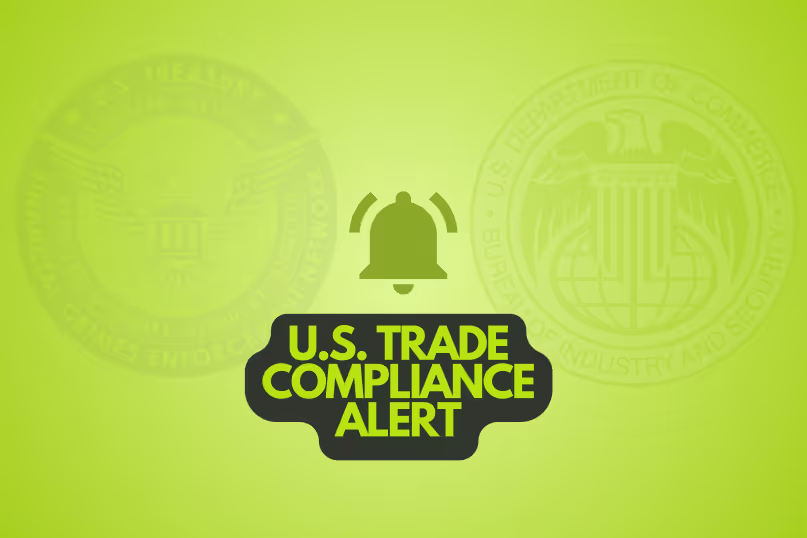
FinCEN's New SAR Reporting Term: Key Insights
In November 2023, the Financial Crimes Enforcement Network (FinCEN) and the Bureau of Industry and Security (BIS) jointly released a notice with two need-to-know updates for compliance teams involved with US exports. The first concerns a new SAR reporting key term. The second regards a 'select list' of indicators (red flags) for detecting potential breaches in US export regulations. In this sanctions.io report, we succinctly break down the changes.
As the saying goes, the devil is in the details, but before we delve into them - let's briefly review the joint release's background.
FinCEN & BIS November 2023 Notice: The Background
On November 6, 2023, FinCEN and BIS published their joint notice (click for the full PDF). But why did they do this? And why is it important? The background to the alert is this:
FinCEN (a bureau of the US Department of Treasury) and BIS (a bureau of the US Department of Commerce) are increasingly collaborating to strengthen export controls and prevent the global evasion of US Export Administration Regulations (EAR).
And although it's easy to get lost in regulatory compliance language - and all those acronyms - it's essential to remember that the US government's motivation for these actions all comes down to national security.
The joint release includes brief quotes from FinCEN's director and BIS's Assistant Secretary of Commerce for Export Enforcement. The key message is, of course, security.
This is what they said:
FinCEN: "The purposeful evasion of US export controls, regardless of where it occurs or the adversary it supports, is a serious national security issue."
BIS: "Disrupting the diversion of critical US technologies to nation-state adversaries and malign actors around the globe is our highest priority."
So, before we dive into all those regulatory details and Suspicious Activity Report (SAR) key terms, it's essential to remember that the 'why' driving it is highly political and related to US national security.
FinCEN & BIS November 2023 Notice: Summary
As alluded to already, the joint notice contains two specific announcements:
- New Key SAR Term "FIN-2023-GLOBALEXPORT"
- Red flag indicators of export control evasion
In the following sections, we will expand on both points and reveal the primary takeaways compliance professionals involved in US exports need to know.
November 2023 Notice: New Key SAR Term "FIN-2023-GLOBALEXPORT"
As most of you reading already know, financial institutions in the US submit Suspicious Activity Reports (SARs) to notify FinCEN of transactions possibly tied to money laundering, fraud, terrorism financing, or other criminal activities. Banks are legally required to file SARs upon detecting suspicious activities, and failing to submit them can result in legal quagmires, possibly resulting in criminal convictions.
Note that BIS uses SARs to investigate violations of US export control regulations (hence the joint release and collaboration with FinCEN).
Here is a link to FinCEN's 60+ Suspicious Activity Report (SAR) Advisory Key Terms. The key terms - essentially filing codes - must be included in a SAR submission on FinCEN's filing system.
So what just changed?
In November 2023, FinCEN created a new code: "FIN-2023-GLOBALEXPORT" (placed in Field 2 of a SAR).
And why did they create this? And what does it mean for companies legally required to submit SARs?
Let's put this into layperson's terms. SAR submissions to FinCEN (related to export violations) appear to be dominated by potential Russian export control evasion in response to Russia's invasion of Ukraine.
FinCEN and BIS previously issued two joint alerts in June 2022 and May 2023, urging financial institutions to be vigilant about this, using the key term "FIN-2022-RUSSIABIS" in SAR fillings.
In the November 2023 notice, FinCEN and BIS are instructing financial institutions to use the new term "FIN-2023-GLOBALEXPORT" when reporting suspicious activity by individuals or entities seeking to evade US export controls not related to Russia's invasion of Ukraine.
If your businesses are any of the types of organizations on this list, then this update is legally applicable to you:
- Casinos
- Depository Institutions
- Insurance Industry
- Money Services Businesses
- Mortgage Co/Broker
- Precious Metals/Jewelry Industry
- Securities and Futures
In the following section, we'll expand on the other important announcement in the notice.
November 2023 Notice: The 'Select List' of Red Flags Explained
The second part of the joint notice from FinCEN and BIS is dedicated to what is described as a 'select list' of potential red flag indicators of export control evasion that may be relevant to financial institutions.
In this report, we won't list all 22 of them as each contains precise information. However, compliance teams from companies subject to US Export Administration Regulations (EAR) should familiarize themselves with the select list.
You can view the list (the report uses red-flag icons, so you can't miss them) from page 3 of the joint notice.
However, to give you a taste, here are some appearing towards the top of the list:
- Transactions involving customers with phone numbers with country codes that do not match the destination country.
- A customer purchases or sells vessels or other properties and goods identified as having been involved with or being blocked property under US or partner country sanctions.
- Transactions involving companies that are physically co-located or have shared ownership with an entity on the Entity List or the SDN List.
One important takeaway from the select list is that to comply with US Export Administration Regulations (EAR) and US sanctions laws, the sanctions screening of customers and business partners, as offered by sanctions.io, is imperative.
How sanctions.io Supports US Export Compliance
sanctions.io is a highly reliable and cost-effective solution for sanction checking. AI-powered and with an enterprise-grade API with 99.99% uptime are reasons why customers globally trust us with their sanctions screening needs. To learn more about how our sanctions, PEP, and criminal watchlist screening service can support your organization's compliance program:
We also encourage you to take advantage of our free 7-day trial (no credit card is required).



